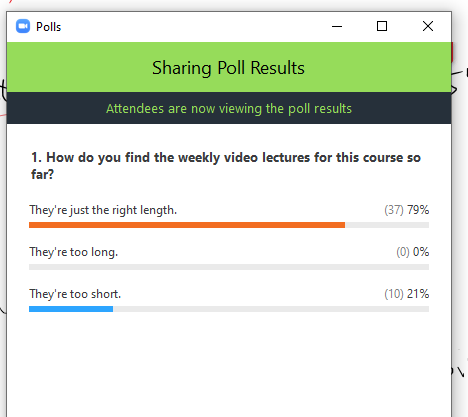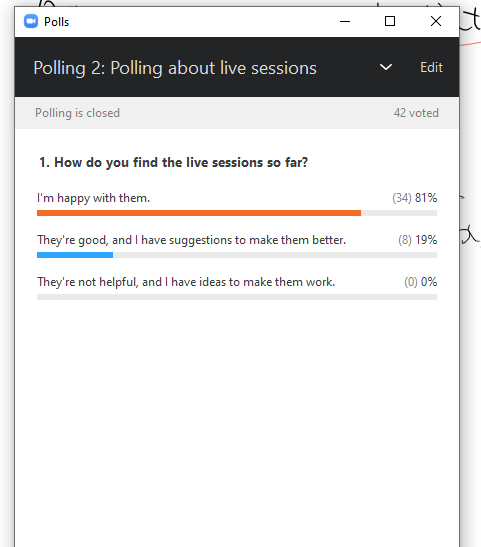It’s been a hectic start to 2020 Fall. We moved to Winnipeg MB from Mississauga ON in Aug and did self-isolation for two weeks due to COVID-19. Shortly after that I got my teaching assignments for Fall semester: MATH1510 Calculus I, MATH2720 Multivariable Calculus, and MATH2030 Combinatorics. I will coteach MATH1510 with another experienced instructor who has been teaching this course for many years and he took on the coordinator role. I’m on my own for the other two courses, which also means I have more liberty as to how to run the courses. For MATH2720, I decide we are going to make the best use of existing OERs for this course, and the textbook I chose is Active Calculus written by Steven Schlicker. This turns out to be a great choice as students love the interactive visualizations and practice exercises in the end of each section. We also use Hypothes.is for social annotation and Piazza for discussions. To see the details of how this course is structured, you can find my course syllabus here. For the weekly videos, I used Zoom’s recording function, and recorded myself working through examples on OneNote, then added interactive questions in all of them using H5P. A complete list of these interactive videos are available: you’re welcome to reuse them as they are all under CC license. For the other course, the instructor who taught it last semester was very kind and shared all his materials with me so I kept the course structure more or less the same except the assessments. A copy of the syllabus can be found here.
This is our 4th week into the semester, and I did a short survey during the synchronous sessions for all the classes to see whether students are happy with their online experience so far. You can see the responses in the pictures below.


Here are a few things that work well so far:
- Using Excel to track student’s questions: for every class that I teach, I created an Excel document from day 1. Each worksheet corresponds to one lecture, and there are two columns: Questions, and Comments. Students are encouraged to put their questions in the document, and I will address them during live sessions. This turns out to be working really well. I know it’s hard to track what they asked in Zoom chat window because a) I can’t monitor chats all the time while I’m teaching; b) when there are too many questions, older ones get buried pretty fast. Using Excel would solve both issues; and since it’s a collaborative document, it’s nice to see them typing in real time, which tells me they are present. At the end of each worksheet, the link to the recorded Zoom sessions and my lecture notes are posted so they can always go back to a certain lecture and quickly find what they are looking for.
- Using Piazza discussion forum: this is a game changer in terms of me communicating with students. I no longer need to reply to the same question multiple times. In the first two week, I had to “force” students asking questions there even if they first sent me emails; I would say “can you please post this question on Piazza and I will respond there”. They get used to posting on Piazza pretty fast. For my courses that adopted Piazza, I almost never get emails: I visit the discussion forum regularly and if students haven’t already answered each other’s questions, I would chime in and clarify doubts. It’s also very easy to create quick polling questions. My first two weeks’ Student Hour has been really quiet so I created a poll on Piazza and pushed it to students’ reading list to determine an alternative timing that works for them. They responded pretty fast.
- Using Zoom sessions as Q&A: whenever we meet online synchronously, I use the time to answer students’ questions. I don’t do formal lecturing at all. This has been working well based on their feedback.
- Using Hypothes.is for social annotation: since we are using an open textbook that’s online, it makes sense to offer students the opportunity to annotate online. I can take a glance at their annotations and have a pretty good idea of how much they understand the materials and what I should talk about when we are all online.
One thing that didn’t work well and I’d like to know how to fix it is using Break-out Rooms: I tried to send students to break-out rooms for discussions, but it didn’t work. Some didn’t join, some didn’t participate even when they are in a break-out room. My guess is more structures are needed, and some form of collaborative space should be open to them so they can record their progress (google doc? google slides?). If you have good ideas about how to use Break-out rooms, please do share.
Today is mid-autumn day for Chinese in China and overseas. It’s a time of family reunion. I wish my mum is still around. Even though I don’t usually get to spend holidays with them back in China, it still feels like home when she’s around.